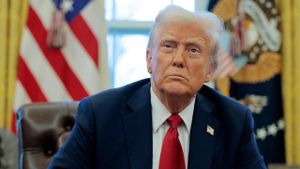Elon Musk's powerful influence over segments of the U.S. federal government has stirred significant concerns about transparency and democratic norms. What began as President Donald Trump's initiative to modernize technology within federal agencies has evolved, according to critics,into Musk's assertive operation across multiple levels of government.
At the heart of this transformation is the "Department of Government Efficiency" (DOGE), organized through an executive order by Trump shortly after his inauguration. This order replaced the established U.S. Digital Service with DOGE, aligning teams composed mostly of young technology engineers, many of whom are barely out of college and lack traditional government credentials. These recruits were handpicked, ideologically aligned with Musk, and wittingly put in charge of accessing sensitive government data.
According to the Associated Press, these operatives have gained entry to such delicate data as U.S. Treasury payment systems and classified intelligence from the U.S. Agency for International Development (USAID). Through DOGE, Musk's recruits gained unprecedented authority to override typical hiring practices, bypassing standard security clearance protocols.
These developments have prompted serious allegations of misaligned authority and accountability. Critics warn of potential overreach, labeling the influence of Musk and his recruits as nothing short of corrosive to public trust. Under normal circumstances, the checks and balances of government exist to shield against executive overreach, but Musk's engagement has reportedly muddled these lines.
One notable example spotlighted is Edward Coristine, just 19 years old and freshly graduated from high school, who now has attended high-level meetings instructing career government professionals on their roles. This has alarmed seasoned employees, who have been forced to justify their longstanding positions to those with little experience.
Alongside Coristine, other young recruits include Akash Bobba and Luke Farritor, who were swiftly placed inside the Office of Personnel Management and General Services Administration, respectively. Critics are left questioning the legal grounds and moral authority underpinning such appointments.
The situation escalated ominously as it was revealed Musk's operatives have access to the Treasury’s network, where financial systems managing trillions of dollars, including Social Security payments and Medicare, are monitored. While officials claim their access is "read-only," it signals problematic monitoring capabilities without any prior citizen oversight.
Perhaps the most alarming of these developments is the reported ambition to dismantle the USAID, which has traditionally operated beyond the political fray, providing humanitarian assistance worldwide. Musk's recent proclamations declaring the shutdown of this agency — which he famously described as "a ball of worms" — prompted concerns over the potential destabilization of U.S. foreign aid.
Peter Thiel, Musk's long-time ally, adds another layer of complexity to this overarching narrative. Thiel has consistently moved to privatize government functions for years, and his fingerprints can be seen on the strategies being undertaken within DOGE. His Thiel Fellowship serves as nurturing ground for young talent, emphasizing anti-government entrepreneurship at the expense of more traditional routes of governance.
Academics weighing in have labeled Musk's maneuvering as nothing short of dangerous. Don Moynihan, from the University of Michigan, underscored the severity of the situation, stating, "This is not efficiency; this is a coup." With Musk evidently cultivating power unchecked by traditional governmental oversight, the fusion of corporate interests and public policy creates uncomfortable parallels to oligarchic governance.
The political implications are no less severe. Critics argue this alliance between businessmen and political leaders signifies heightened risks to the integrity of democratic processes. The breadth of Musk's reach — from financial oversight to personnel management — poses existential questions on the nature of public service. Further complicity expected within Congress, already hinting at acquiescence to this delineation of power, adds to anxieties surrounding the oversight vacuum at play.
Public sentiment is reflected starkly: recent polling indicates increased distrust of Musk, with his net approval rating plunging. This could be attributed to rising apprehension surrounding the privatization of public data which remains at risk of misuse.
Critics assert this situation exemplifies the need for heightened scrutiny over Musk's influence within government, as the consequences of this power shift echo across multiple layers of society.
Consequently, this monumental upheaval emphasizes the importance of re-establishing checks and balances to prevent any single individual from commandeering the levers of power. Absent this oversight, federal governance could transform irrevocably, echoing risks already realized under authoritarian leaders worldwide.



